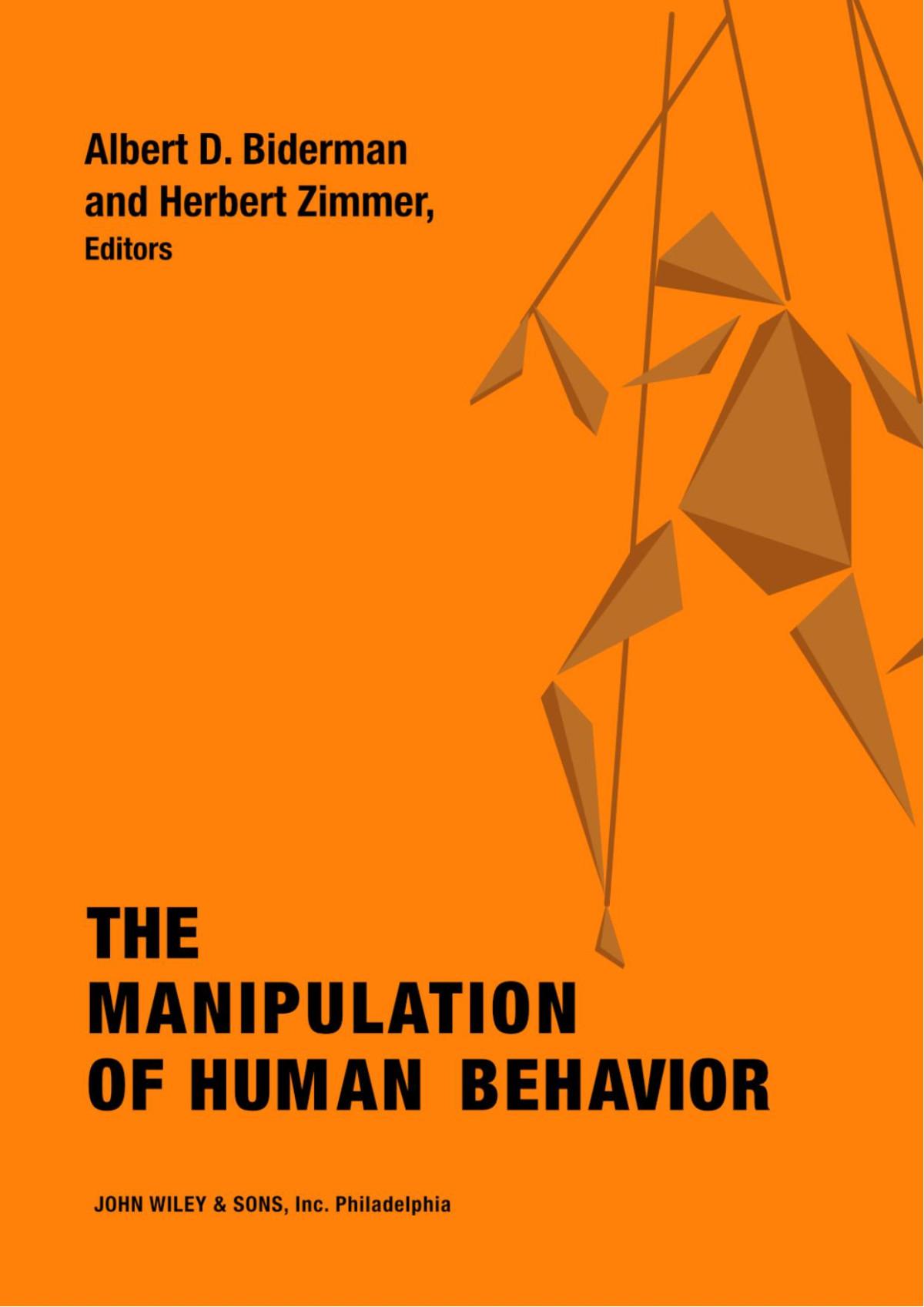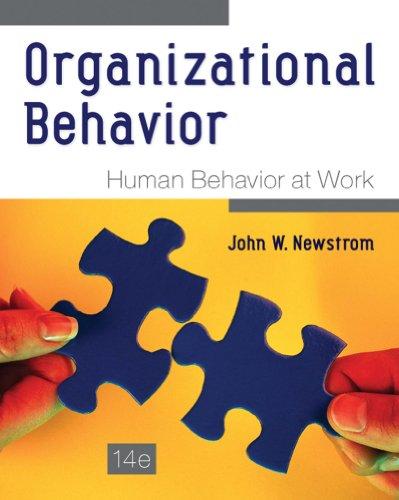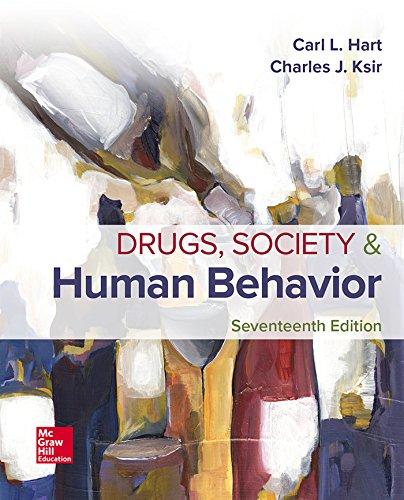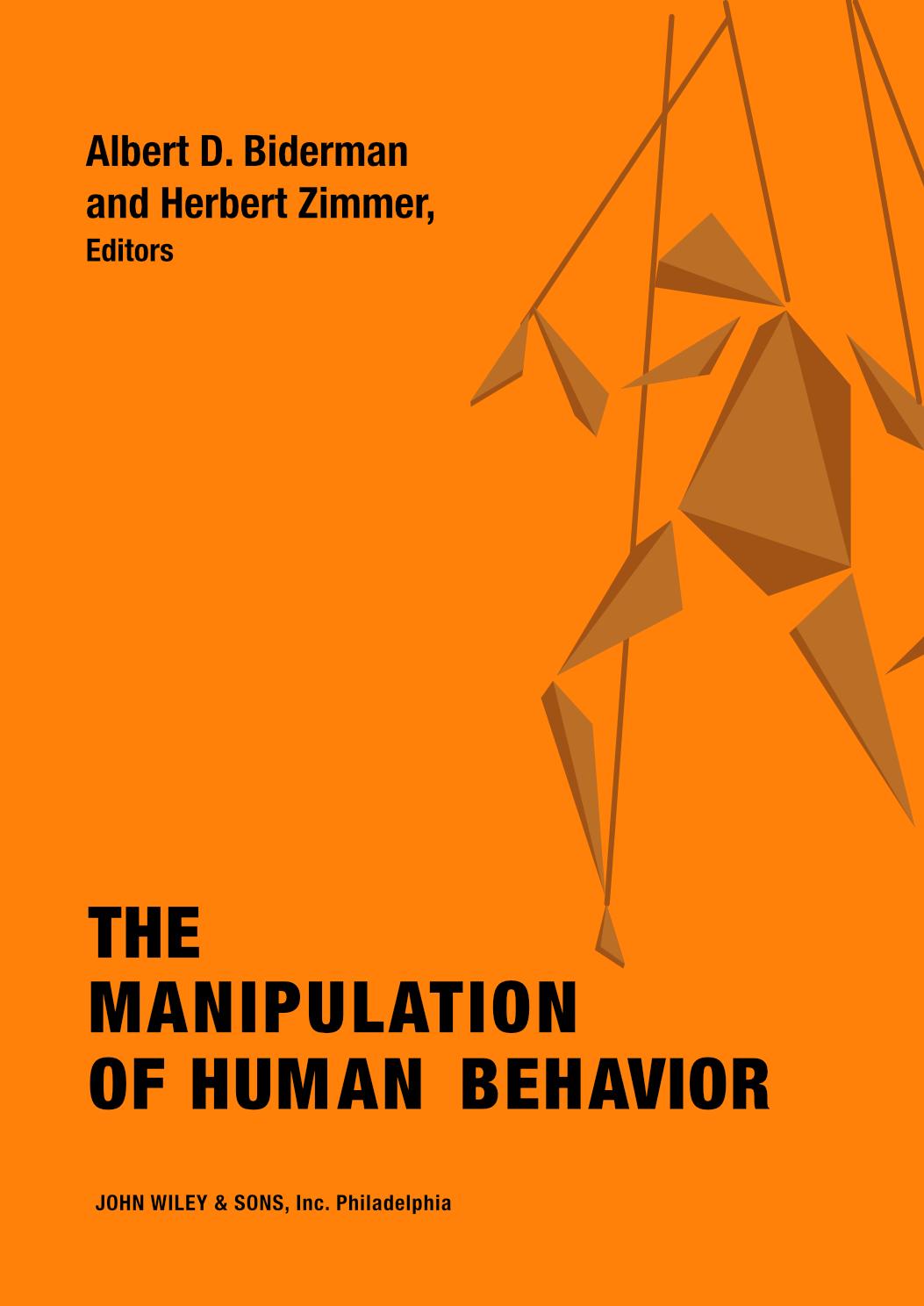The Manipulation of Human Behavior
Albert D. Biderman
Visit to download the full and correct content document: https://ebookmass.com/product/the-manipulation-of-human-behavior-albert-d-biderma n/

More products digital (pdf, epub, mobi) instant download maybe you interests ...

Organizational Behavior: Human Behavior at Work: Human Behavior at Work 14th Edition – Ebook PDF Version
https://ebookmass.com/product/organizational-behavior-humanbehavior-at-work-human-behavior-at-work-14th-edition-ebook-pdfversion/

Consumer Behavior 7th Edition Wayne D. Hoyer
https://ebookmass.com/product/consumer-behavior-7th-editionwayne-d-hoyer/

Consumer Behavior, 8e 8th Edition Wayne D. Hoyer
https://ebookmass.com/product/consumer-behavior-8e-8th-editionwayne-d-hoyer/

Essentials of Human Behavior: Integrating Person, Environment, and the Life Course 2nd Edition, (Ebook PDF)
https://ebookmass.com/product/essentials-of-human-behaviorintegrating-person-environment-and-the-life-course-2nd-editionebook-pdf/

Human Behavior in the Social Environment: Perspectives on Development and the
Life Course
https://ebookmass.com/product/human-behavior-in-the-socialenvironment-perspectives-on-development-and-the-life-course/

Drugs, Society, and Human Behavior 17th Edition, (Ebook PDF)
https://ebookmass.com/product/drugs-society-and-humanbehavior-17th-edition-ebook-pdf/

The Palgrave Handbook on the Economics of Manipulation in Sport Markus Breuer
https://ebookmass.com/product/the-palgrave-handbook-on-theeconomics-of-manipulation-in-sport-markus-breuer/

Conventionally Yours Annabeth Albert
https://ebookmass.com/product/conventionally-yours-annabethalbert/

Drugs, Society, and Human Behavior 17th Edition – Ebook PDF Version
https://ebookmass.com/product/drugs-society-and-humanbehavior-17th-edition-ebook-pdf-version/

THEMANIPULATIONOF
editors
ALBERT D.BIDERMAN BureauofSocialScience Research,Inc.
HERBERT ZIMMER Associate ProfessorofPsychology UniversityofGeorgia
John Wiley&Sons, Inc.,NewYork· London -ii-
THEMANIPULATIONOF HUMANBEHAVIOR -iii-
Copyright©1961 byJohnWiley &Sons,Inc.
Allrights reserved.Thisbookoranypartthereofmustnotbereproduced inanyform withoutthewrittenpermissionofthepublisher,exceptforanypurposeoftheUnitedStates Government.
LibraryofCongressCatalogCardNumber:61-5669
PrintedintheUnitedStatesofAmerica -iv-
Contributors
ROBERT ROGERSBLAKE,Ph.D. ProfessorofPsychology, UniversityofTexas
R.C.DAVIS,Ph.D. ProfessorofPsychology,Indiana University
LOUISA.GOTTSCHALK,M.D.
Associate ProfessorofPsychiatryandResearchCoordinator, DepartmentofPsychiatry,CincinnatiGeneral Hospital
LAWRENCEE.HINKLE,Jr., M.D.
Associate ProfessorofClinicalMedicineinPsychiatry, NewYorkHospital—CornellMedicalCenter
PHILIPE.KUBZANSKY,Ph D.
ChiefPsychologist,BostonCityHospital
MALCOLML.MELTZER, Ph.D.
StaffPsychologist,DistrictofColumbiaGeneralHospital
JANES.MOUTON,Ph.D.
SocialScienceResearchAssociate, UniversityofTexas
MARTINT.ORNE, M.D.,Ph.D.
TeachingFellow,DepartmentofPsychiatry, Harvard UniversityMedicalSchool
to CHARLESE.HUTCHINSON and HERMANJ.SANDER fortheirleadership inthis area
Acknowledgments
TheeditingofthisbookwascarriedoutasaprojectoftheBureauofSocialScience Research,Inc.Dr.RobertT.Bower,directoroftheBureau,generouslygavehis time andtalentstothis project.
Valuableassistanceineditingthecontributors'manuscriptswasgiven byNadine Pitts,FrankG.Davis,MerleGoldberg,andDorisF.Julian.
Thepreparation ofthechapters containedinthis bookwas supportedinpart bythe UnitedStates AirForceunderContract18(600)1797monitored bytheRome Air DevelopmentCenterofthe AirResearchandDevelopmentCommandandunder ContractAF49(638)-187monitored bytheAir Force OfficeofScientific Researchof theAirResearchandDevelopmentCommand.
The work ofthe editorswasgreatly facilitated byrepresentatives ofthe Air Force, particularlyMajorLeoN.BrubakerandLieutenantColonelRobertE.Work.
Thechapters byDr.Martin T.Orne and byDr. LawrenceE. Hinkle,Jr., drawupon worksupported bytheSocietyfortheInvestigationof HumanEcology,Inc.
1ThePhysiological State ofthe Interrogation Subject asitAffectsBrainFunction 19 LawrenceE.Hinkle,Jr.
2TheEffectsofReducedEnvironmentalStimulation onHumanBehavior:AReview 51 PhilipE.Kubzansky
3TheUseofDrugsinInterrogation 96 LouisA.Gottschalk
4PhysiologicalResponsesasaMeansofEvaluating Information 142
R.C.Davis
5ThePotentialUsesofHypnosisinInterrogation 169
Martin T.Orne
6The Experimental Investigation ofInterpersonal Influence 216
RobertR.BlakeandJaneS.Mouton
MalcolmL.Meltzer
wolltenurforschen, Raetselloesen,ein Stueckchen Wahrheit aufdecken.Dies magvielen wehe, manchenwolgetanhaben,beidesnichtmeineSchuldundnichtmeinVerdienst. SigmundFreud ina letter toRomain Rolland,May13 1926 *
Introduction—manipulationsofhuman behavior
Inrecent years,concernhasbeenexpressed,inbothscholarlyandpopular literature,aboutthedangersofscientificdevelopmentsthatcouldbe usedtocontrol andmanipulate humanbehavior.Thefearis frequentlyvoicedthattechniqueshave beendevelopedtoanextentwhichthreatensfundamentalvaluesof Western civilization.
Anxious alarmsanddramaticspeculationshaveovershadowedreportsofsober effortstodeterminewhichdangersarerealandwhichimagined.
Thisbookrepresentsacriticalexaminationofsomeoftheconjecturesaboutthe applicationofscientificknowledgetothemanipulationofhumanbehavior. The problemisexploredwithinaparticularframeofreference:theinterrogationofan unwilling subject. A numberofscientificareashave figuredprominentlyin speculationsregardirigtheapplicationofsciencetothemanipulationofbehaviorin interrogation(69).Forthiswork,scientists whohaddoneresearchineachofthese areaswere askedtoreview thestate ofrelevant knowledgein theirfields, toconsider whetherandhowitmightbeapplied byinterrogators,andtoevaluatetherecourse available tohighlymotivatedpersonsforresistingtheattemptedinfluence.Their reportsconstitutethebodyofthisbook.
Attentionhasbeenfocusedoninterrogationbecauseofthecentralpositionthis topichashadinrecentpublicdiscussionsofprisoner-of-warbehavior—issuesthat madescientificmethodsofmanipulatingbehavioramajorpublicconcern.Muchofthe workinthisbookwas sponsored bytheU.S.AirForcebecauseoftheir interestinthe problemswhichfacetheprisonerofwar. Suchaspectsofprisonerexploitationas ideologicalconversionandtheelicitationoffalsecon-
*E. L.Freud, AusgewaehlteBriefe,Berlin:S.Fischer,1959.
fessionshavereceivedrelativelymorepublicandacademicdiscussionthanthe attemptsto elicitfactualinformationthroughinterrogation.Nonetheless,theeditors believethattherearesomemajoradvantagestoapproachingthebroadertopicofthe manipulationofhumanbehavior bylimitingattentioninitiallytothelatter typeof situation.Thebackgroundofrecent concernwiththeseproblemsmay illuminatesome oftheconsiderationsleadingtotheparticularemphasisofthis work.
Background
ThenotorietythatCommunistexploitationofUnitedNationsprisonersofwarhas receivedintheUnitedStatesgave impetustoprofessionalandlayconcernwith problemsofthemanipulationofbehavior.Variouswritershaveassociatedthe complianceeffected byCommunistcaptorswithphenomenaobservedinthe laboratory;e.g.,effectsreportedfollowingexperimentalworkinpharmacology, hypnosis,sleepdeprivation,sensorydeprivation, semi-starvation,electricalstimulation of the brain,as wellas in social-psychologicalinvestigations ofpersuasion and group conformitypressures(3,10,13,14,16,20,23,24,28,32,39,67).
Themostradicalexpressionsofconcernhaveallegedthattechniquesfor manipulatingbehaviorarenowcapable,orareatleastonthethresholdofbeing capable,ofeliminatingthedeterminationofthesubjectasabarriertosuccessful influence(21,32,33,34,35,36,37,38,39,44,52,60).Theseclaimshavebeen challenged:otherinvestigatorshavebeenimpressed bythestrength,stability,and resilienceoflong-establishedvaluesandsocialcontrols,and byrationalregardfor self-interest,eitheraslimitingthecomplianceofthose subjectedtocoerciveand persuasiveinfluenceattempts,orasenablingthe subjecttoresistcompletely(2,4, 7, 11,15,18,50,53,54,55,65,66,68).
Certainothercommentatorshaveviewedthesuccessfulexploitation ofcaptivesin Koreaandsimilarincidentsaslessindicativeofincreasingperfectionintheartsof influenceandcoercion.Theyhaveattributedthesuccessesofthecaptortoindividual defectsofbackgroundandstaminaintheprisonerswhocollaborated,ortoageneral deteriorationof thevitality of socialvaluesand controlsincontemporary society(16, 25,31,61,62,63).
Scientificexaminationofthemanipulationofbehaviorhasbeenmadedifficult by theintensityoftherecentcontroversy overnational
-2-
prisoner-of-warpolicy.Conceptssuch asdeterminismvs.moralresponsibilityare amongthephilosophicalandvalueconsiderations implicitinthisdebatewhichhave addedconsiderablytotheproblemsalreadyposed byexistingbiases.Therehasbeen disputeregardingtheextenttowhichindividualrepatriatedprisonersofwararelegally ormorallyresponsiblefordeviationsfromidealstandardsofmilitaryconduct, especially inthe matterof yielding informationor making"confessions" to thecaptor (9,25,31,39,41,47,49,54,64).
A centralquestionoffact hasstoodoutinthiscontroversy,quiteapartfromthe moralandphilosophicalissuesraised:whetherallindividuals,regardlessofhow stronglymotivatedtoresist,couldbemadetocomplywithdemands forinformation, "confessions,"orothercollaboration bymethods employed bytheCommunists, providedthattheintensity,duration,andqualityofthepressuresweresufficiently great. Popularly, thisproposition wasphrased: "Everyman hashis breakingpoint."It gainedacceptance as a premisein policyformulation, althoughthequestion remained regardingwhich,ifany, ofthesituationsencountered byUnitedStatesprisonersofwar inKoreaapproachedthoseextremesof"stress"thatnoindividualcouldbeexpectedto lesist(40,48,64,68).
CriticsofthepolicyevolvedaftertheKoreanWar—"TheCode ofConduct"— arguedthatthefailureofthepolicymakerstoconsider imminentdevelopmentsin scientificmethodsof humanmanipulationhasbeen amoreserious errorthanalack of understandingofthepracticesactuallyencountered byprisonersinKorea. One scientist(39,page54)haswritten:"...onethingiscertain—ournationalpolicy concerningtheconductofourprisonersofwarhasnot yetfullyfacedupto psychologicaldevelopmentswhichareappearingoverthehorizonofthefuture."His ownconclusionwasthatarmed forcescouldprotectinformationfromanenemyonly bydenyingittopersonssubjecttocaptureor,wherethiswasnotfeasible, bygiving suchpersonsmeansfor destroyingeitherthemselvesortheir memories.
Inthestudyleadingtothepresentbook,the U. S. AirForcethroughtheir sponsorshiphas soughtanauthoritativeexaminationofpublicizedspeculations regardingthepossibleuseofscientificdevelopmentsinthemanipulationofbehavior againstfutureprisonersofwar A specificobjectivehasbeentoexamineanenemy's possible useofscientifictechniquestoelicitguardedinformation fromcaptives,which istheformof prisonerexploitationhavingthemost immediateandand directmilitary significance.
Itisaxiomaticthatinterrogationhasbecomeahighlyoverdramatizedsubject.Aside fromtreatmentsof itsmoresensationalaspects,
verylittleinformationonthetopicappearsinopen-sourceliterature.Thedearthof sober informationon interrogationhas hadtheunfortunate consequence offacilitating theexploitationofUnitedStatesprisonersofwar byCommunistcaptors(64).
Ourpurposeherehasbeentobringtogetherinonebookauthoritativeinformation onmethodsofbehavioralcontrolthathavebeenthesubjectofconsiderable speculationindiscussionsofinterrogation.Scientistsrepresentingavarietyof fields haveexamined a numberof hypothetical meansthatmightoccur toaninterrogatorfor elicitinginformationagainstthewillofhissubject.Theirattentionhasbeenmoreon whatcouldbedonethanonwhatactuallymayhavebeendone.
Allthequestionsthatarefrequently raisedaboutthesemethodscannotbeanswered by such an approach,however,since many ofthem arenot translatableinto scientific terms.
Origin ofNonrationalConcern
Manyscholarshaveobservedthatsciencereplacesmagicandwitchcraftas societiessecularize.Theproblemsoflivinginthepresentageremainmuch asthey havealwaysbeen,however.Theygeneratemanyofthesamewishes andterrors. The aspirationsandanxietiesthatnotsolongagowereprojectedontoconceptionsofthe wizardandwitcharenowdirectedtothescientist.
Twoofthemostbasicoflife'sproblemsarelinkedtotheindividual'spower position vis-à-vishis fellowmen: theinabilityto make othersfulfillone's wishes; and thereverse,thefearofbeingcontrolled byothers,withtheconsequentlossofthe autonomythatisbelievedtobefundamentaltotheconceptionoftheself.These oppositesareincongruouslyexaggeratedinparanoidthinking,one ofthemost prevalentmental symptomsofWestern man.Theydoubtlessexistin thefantasyof mostpersons,toextentsthatdiffer fromparanoiainintensityandpervasiveness.
Theprofoundfascinationofthetopicunderconsiderationmaystemfromthe primitive,unconscious,andextremeresponsestotheseproblems,whichgain expressionin myth,dreams,drama,andliterature.Ontheonehand,thereisthedreamwishforomnipotence;ontheother,thewishandfearofthelossofselfthroughits capture byanother.Thecurrentinterestinproblems ofmanipulationofbehavior involvesbasic ambivalencesoveromnipotenceanddependency, which,ifprojected, findareadytargetinthe"omniscient"scientist(30).
MythandReality
The "madscientist"ofthehorrormovie andnovelhasbeenwith usformany years. Morerecent fictionhasenlistedhimintheserviceofthegreatnation-state.Withthe perfectionofmass-destructionweaponsandthe elaborationoftotalitarianeffortsto controlhumanbehavior,themyth hasbeguntoconverge withaspectsof reality.
Conjecturesconcerningtheprospectsof"totalannihilationofthehumanwill" appearalmostasfrequentlyasthose regardingthethreatofmankind'stotaldestruction bythermonuclearorsimilarweapons.Regardingweaponsofphysicaldestruction, responsiblescientificevidenceisofferedalongwithuninformedandill-informed surmises,bothinsupportofforecastsofdoomandinrebuttal.Inthecaseofthethreats scienceposestohumanautonomy,however,sensationallyspeculativeexpressions,like thoseofthe BraveNew World thatAldous Huxley(21)recentlyrevisited,haveenjoyed anearmonopoly.Inprofessionaljournalsandpublications,as wellasinstatementsfor popularconsumption,scientistshavesometimescontributedtouncriticalthinking regarding thepotential applicationof scientific developmentsto thecontrol ofhuman behavior.Somescientistshavedonesointheirzealtomakethepublicawareofthe dangeroustoolwhichthetechniquesformanipulatingbehaviorcouldbecomeinthe hands of totalitarianand otherirresponsiblepractitioners.Acommonerror hasbeen to assumethatsome scientificdevelopment,or someexplicitscientific theory,wasbeing applied byCommanist"brainwashers"andothermanipulators(2,4,5,18).Other scientists,and interpretersof science,have alsocontributed tothe identificationof the behavioralscientistasapowerfulandunscrupulouspractitioneroftheartsof influence,asinVancePackard's HiddenPersuaders (45).
Ithasbeenpointedoutthatthewaysin whichthepopularcommunicationmedia definetheproblemareakintothoseofprescientifictimes(56).RaymondBauer(2) hasnotedtheresemblanceoftheconcept"brainwashing"todemonology:theideaof the"brainwashed" doesnot differgreatly fromthat ofthe "possessed"(6). "Thebattle forthemind"(52), sometimesfoughtagainst"thehiddenpersuader,"hasmany elementsoftheoccult.
Viewingtheprobleminmagicalordiabolicaltermsisnotanaltogetlierirrational analogy, giventheexistenceof thosewho simultaneouslypracticeand seekperfection ofthe meansfor controllingbehaviorandconceiveoftheireffortsasdirectedtoward "possessingthewill"oftheirvictims.Asoneofushaspointedoutindiscussing
Communistinterrogationandindoctrinationpractices(6),theWesternconceptionof "brainwashing,"interms akinto"possession," ismatched bythe Communists'viewof whattheyseekandhowtoachieveit asexorcism. Thus,theChineseCommunist leadersnotonly findnothingtoresentinchargesthatthey"brainwash"theiropponents (cf.1), butregard theterm as a quiteapt andhonorable descriptionof whatthey wish toachieve.Totake anotherexample,the symbolic imageryofthemedieval Hexenhammer (22)isreflectedinthedesignationoftheSoviet WorldWarII inquisitorialapparatus asSMERSH ("DeathtoSpies") (57).
Scientific sobrietydemandsthatthedryexaminationofexperimentalevidence replacethelivelybooksonexorcismofancienttimes.Asinmanycontemporaryworks whicharecloser tothelivelierloreof ancienttimes,however, thepresentreview deals withhumanconcernsantedatingsciencethatareattherootofthecentralquestion: "Canmanreallybemadetobehavecontrarytohisprofoundestbeliefsandhis consciousself-interest?"
Symbolsofsciencecanbeusedinamagicalway,asmuchofthe"brainwashing" literature illustrates.Various writershaveinvested the techniquesof interrogatorswith themagicofscience byattachingtechnicallabelstowhatactuallyhavebeen traditionalandpragmaticpractices(2).Inassumingtheattitudeofthe"hard-headed" scientisttowardtheproblem,thereisadangerinfallingintoanequivalent misuseof science.Thiswouldbethecasewereone,ineffect,toattempttocounter thosewho present a diabolical imageof the "brainwasher" by invokingsuperior scientificdeities tofrightenthisspecteraway.Thus,magicalthinkingandprojections,ashasbeen indicated,pervadeprevalentjudgmentsregardingthesignificanceofthebehavioral alterationsthat interrogators can effect. By substituting impassivescientific namesfor ordinarylanguage withits intenseconnotations forhuman values, the impression may begivenofeliminatingnotonlytheseextravagantjudgmentsbutalsoalmostallthe human significanceof theseeffects. Inthis way,for example,"treachery" canbecome mere"attitudechange"or"ashiftinthesubject'sframeofreference."
IsControl ofBehaviorAsymptotic?
Difficultiesinhereindealingscientificallywithaproblemthatrelatesso immediately tobasichuman values. Assumptionsin this work holdthe personagainst whomtheinterrogationeffortsare
directed— whois designatedfollowingcommonintelligence usage as"thesource"— tobehighlymotivatedtosafeguardtheinformation;andthat,atleastinitially,the sourceregardsdenyinginformationtohisinterrogatoras"moreimportantthanlife itself."Itapparentlyhasnotbeenararityforindividualsundergoinginterrogationto say"goahead andshoot" inthe faceof aconvincing threatof death,and yetto reveal theinformationthusguardedunderseeminglymildpressurelater(8).Similarly, Westernjurisprudencerecognizesthat lengthy interrogation,evenwithoutphysical coercion,canproduce"unwilling"confessions,trueorfalse,ofcapitalcrimes. Divergentinterpretationshavebeen placedonreportedcasesofindividualswhohave resistedveryintensiveinterrogationswithoutdivulginginformation.Someuseitto demonstratetheexistenceofanunconquerable,inextinguishablehumanwill.Others regardtheinstancesofsuccessfulresistancetointerrogationasmereillustrationsof remediabledeficienciesininterrogationtechnique.
Neitherthisnoranyotherscientificvolume,intheopinionoftheeditors,can resolvethedifferences implicitinthesetwoorientations,or yetotherinterpretations. Onthebasisofscientifictests alone,theyaredifficulttoresolveevenwitha completelydeterministicsetof assumptions.Asthe approachofthis reviewillustrates, foranygivensetofmotivationsofthe source,howeverpowerful,onecanat least speculateaboutpossiblemanipulationstoovercomethem.Ontheotherhand,itis possibletospeculateaboutmethodsofheighteningmotivationsanddefensesagainst anyconceivablemanipulativeassault.Exclusivelyscientifictestsprobablycannot forecloseeitherpossibilityatthistime.
Another importantqualificationtoconventionalideasabouttheultimatelimitsof thecontrolofhumanbehaviorwillbecomeapparentinsomeofthediscussionsthat follow.Thepurposesthatmenhave inseekingtocontrol,or toinfluence,the behavior ofothersinvolvethedistinctively human capabilitiesofmen andtheirsignificance for oneanother. Themajorfallacyofthetotalitarianinterrogatorgrowsoutofapoor appreciationofthisfact.Someofthechaptershereindicatethattherearelimitsto whichtheabilityofasourcetorevealinformationcanbeseparatedfromhis willingness to doso. Theanalyticdivisionswemakebetween suchaspectsofmental activity astherecallandtransmittal ofinformationontheonehandand motivationson theotherdonotcorrespondto behaviorsthataretotallyindependent ofoneanotherin theorganism.Furthermore,muchoftheuse onepersoncanmakeofanotherresidesin thelatter'sabilitytofunctioninavoluntaryfashion:inhishaving initiative,makingchoices,preferring,andrejecting. Thefallacyofbeliefinthe possibilityoftotalcontrolforanypurposestandsoutasbizarreintheextremewhen actedon bythose whosepurposesinvolvethecontrolofself-initiatedbehavior An example,simultaneouslytragicandridiculous,istheideologicalinterrogation.
A systeminwhichmental conformityissought through coercionand manipulation embodiesanever-presentfearonthepartofthecontrollersthatconformitywillbe basedonopportunismratherthanconviction.Inoppressiveideological systems,such asmodernCommunism,whichdemand "truesincerity"from theirsubjectsratherthan mereoutwardconformity,theinquisitorialprocessappearstobeanatural development.Itisadifficultmattertodeterminewhetherthoughtsareindeed"true thoughts."Theinquisitorialprocess,beingitselfhighlycoercive,reinforcesthe original suspicionregardingopportunisticconformity.Inaviciouscircle,coercionis usedtoproduceconformity,generatingfears thattheconformity producedisinsincere, generatinginturnfurthercoerciontomakeit"sincere." Theabhorrenceofthese practices bythosesubjectedtothemmakesthefearsofthecontrollerswellfounded andfurtherreinforcestheviciouscircle.
Underthesecircumstances,the ultimatetestofthe loyalty andsinceredevotionof theindividualtothe systemishisacceptanceoftheinquisitorialprocessitself:the purge,coercion,confession,andtheentireparaphernaliaofenforcedconversion.
MalleusMaleficarum (22,page212)providesanillustrationofthemannerinwhich thevictimiscompelledtoadopttheframeofreferenceoftheinquisitor:
He[thesuspectedwitch]must beaskedifhe believes thatthere aresuchthingsaswitches,and that such thingsas werementionedcouldbedone,asthattempestscouldberaisedormenandanimals bewitched.
Notethatforthemostpart witchesdenythisat first; andthereforethisengendersagreatersuspicion thanif theywereto answerthatthey left itto superiorjudgment tosay ..Soif theydeny it,theymust bequestionedasfollows:Thenaretheyinnocentlycondemnedwhenthey areburned?Andheorshe mustanswer.(Cf.Krivitzky,26, page141.)
One finaltestofloyaltydemandsthattheprisoneractasthoughhehatedhimself withtheintensity ofthecriminaldefinitionwhichthe systemhasplaceduponhim.
Attheoutsetofthestudythe impressionoftheeditorsfromtheirpriorinvestigation ofinterrogationproblemswasthattheeffectivenessofscientificinnovationsfor controllinghumanbehaviormayhavebeenexaggeratedinmostpublicdiscussions. Before finalevaluations,alarmingorotherwise,wereventuredfromahuman standpointregardingthesignificanceofthecontroloverbehavior
whichscientificdevelopmentswillmakepossible, itwasfeltthatamoresober, systematic,andaccurateexaminationwasrequiredfromapurelyobjective perspective.Thisevaluationrelatestotheapplicabilityofsuchdevelopmentstoa specified typeofobjectiveandtothenatureandlimitsofthealterationsofobjective behaviorthatthesedevelopmentswillpermitawould-bemanipulatortoinduceina resistantperson.Althoughsuchaneffort cannotsettlethe philosophicaland emotional questionsraisedaboutthesignificanceofthecontrolwhichcanbeexerted, itcan indicatethatsomeareill-foundedandotherspremature.Yetothersrelatetovery real matters.
Thisworkdoesnot representan attempttominimize theproblem. Theconclusions reacheddoinfactshowthatmanydevelopmentscancompoundtremendouslythe alreadyalmostinsuperabledifficultiesconfrontingtheindividualwhoseekstoresistan interrogatorunrestrained bymoralorlegalscruples.Ontheotherhand,it canbe shownthatmanyofthemeasurespopularly supposedtorenderaninterrogator omnipotentactuallyhavenodemonstrableapplicabilitytohispurposes.Other measuresthatappeartohavehighpotentialutilityforthecontrolorinfluenceof behaviorseemtoowetheireffectivenesstoquitedifferentkindsofprocesses than popularlysupposed. Amongthelatterare"placebo"measures,thesuccessof which dependslargelyupontheattributiontothemofanonexistentpotency bythe subject, andattimesthemanipulator.Knowledge,itappears,isa"two-edgedsword"in interrogation.
The latterfact isa sourceof somecomfort. Severalscientists havereported onthe possibleapplicationsofscientificknowledgethatmightbemade bythemostcallous
interrogatororpower.Theresultsoftheirthinkingareavailablehereforanyonetouse, includingtheunscrupulous.Thealternativeis to conferonthewould-be manipulatora monopolyofknowledge bydefault.Hissuccess, asthevariouschaptersofthisbook illustrate,dependsheavilyontheignoranceofhisvictims.Skinner(58)hasarguedthat thosewhoaremostconcernedwithrestrictingthevulnerabilityofmentocontrol by othershavethemosttogainfroma clearunderstandingofthetechniques employed (pages320-322).(SeealsoSkinner,59.)
FocusOnObjectiveBehavior
Thequestionofcontrollingfundamentalattitudesandvalues mayholdgreater interestformanythanourattentiontotheelicitingofguardedfacts byinterrogators. Muchconcernofrecent yearsregard-
ingbehaviorcontrol,ashasbeendiscussed,hascenteredonconnotationsthathave cometobeconveyed bytheterm"brainwashing."The sourceofthisconcernisthe beliefthatindividualscanbe"changed"insomefundamentalway bydeviousand mysteriousactsofinfluence.Certainly,Communistpractitionersof"thought-reform" visualizethecreationofa"newman"astheirobjective.Peopleof Westernnations, frightenedand puzzled bythese Communistpractices, havealso feltthat thebehavior displayed bymanyvictimsofsucheffortscouldbeexplainedonlyintermsofsome verybasicchangeswithintheindividual.
The difficultiesconfrontingattempts toexamine suchcomplex issuesscientifically argueinfavorofdealing firstwithsimplerandmoreobjectiveformsofbehavioral influence.Inthe"brainwashing"model,wehaveabasicallynonrationalattemptto effect nonrationalchangesofsubjectivestates.Practitionersof"thought-reform"seek "real"changesin beliefsand values.They demandthat thevictim be"honest, sincere, andfull"inhis "self-examination,repentance,andchange"(27).Itisdifficultto find objectiveindicatorsof theextenttowhich a"thought-reformer"has achieved"honesty andsincerity,"andparticularlydifficultwhengiventhespecialideologicalmeanings suchterms havefor thepractitioners of"thought-reform."Asfor producing"real" and "fundamental"changesintheperson,thesuperficialandstereotypicalconceptsabout humanpersonalityon whichCommunist"thought-reform"effortsarepredicated mightleadonetoexpectthatanyfundamentalchangestheyproducemustbe accidentalratherthanarealizationofadeliberateobjective.
Thereisnoquestionthatitispossibleformentoalter,impair,oreventodestroy the effectivepsychological functioningof othersover whomthey exercisepower. The conceptsinfluence,control,andmanipulationdenoteacertainkindofalteration:the consummationofapurposeoftheinfluencerinthebehavioroftheinfluenced.Ifwe wishtoexaminescientificallyquestionsdenoted bythetermsinfluence,control,or
manipulation,wemustbeabletoobserveobjectivelyandtodefineinprecise terms boththeeffectssoughtandthoseobtained.
Afocus ontheelicitationofguardedfactualinformationsimplifiestheanalytical problemconsiderably byposingamodelthatinvolvessuchobjectivelyspecifiable purposesandeffects. Toachievefurthersimplicityforpurposesofthisreview,the contributorswereaskedtoconsiderastheirprimarymodelinterrogations wherethe interrogator'sobjectivesconsistedofobtainingsimple,objectiveinformationregarding thephysicalworld.
Interrogatorsinthisageof"psychologicalwarfare"increasinglyseek"socialand psychologicalintelligence" fromtheir sources. Asinmost socialscienceinterviewing, thecontentofthis typeofreportingdepends on suchfactorsasthesubjective stateand thepersonalandculturalframesofreferenceofthereporter.Considerable simplificationisachieved byavoidingthecomplexproblemsofinterviewing,which involveinfluencing personstoreport psychological and socialinformation accurately, andtheinfinitely morecomplexquestionofwhatconstitutesaccurateinformationon suchtopics.
Therearevariousmotivationsorvalueswhichmayunderlietheresistanceofa sourcetoaninterrogationattempt.Theinteresthereisinanymethodthrough which thesebasesofresistancemaybechanged,outweighed,neutralized, orcircumvented so thatthepersoncomestobehaveinamannerhewasoriginallystronglymotivatedto avoid.Theparticularformofbehaviortowardwhichattentionisdirected,the impartingoffactualinformation,hasvariouspeculiarities.Someofthesedistinctive featuresareconsideredinthereviews.Fewexperiments,however,havedealt directly withattemptstoelicitpreciselythisformofbehavior.Theattentionofthe contributors wasbroadenedofnecessitytoexploittherelevanceofexperimentsstudying interpersonalinfluenceonotherformsofbehavior.
Thisbookdoesnotpretendtoexaminetheprocesses by whichfundamentaland lastingalterationsofthevalue systemofasubjectcomeabout.Nonetheless,inthe review ofexperimentationon interpersonalinfluence (Chapter6), itwas imperativeto considerknowledgedevelopedthrough experimentsthat involvedtheoreticalconcepts suchas"changesinattitudeorbelief."Fromthepresentperspective,thevalidityof suchobservationsdoesnotdependuponthedegreetowhichobservedchangestruly reflectstableandlastingchangesinthe subject.Whenadeterminationis madethat laterbehaviornegatessomevaluestronglyaffirmedearlierintheexperiment,orthe reverse,theexperimentaccordssufficientlywiththequestionsbeingposedhere.
Althoughthekindofinfluence attemptconsideredhererepresentsaconsiderably simplerproblemthantheattitudechangesorevenattitudereporting usedherefor someinferences,itnonethelessinvolvestheproductionandobservationofcomplex, symbolic,learnedhumanbehavior.Thus,evidenceregardingthe manipulationsthat
arepossibleofthesalivaryresponseorothersimpleresponsesofeitheranimalsor humanswouldnotprovideanswerstothequestionsraised bythisreview.
-11-
ScientificPurpose
Wehaveattemptedheretocommunicatescientificinformationto scientists,andthe workoriginallyundertaken forthe U.S.AirForcehas beenrevisedandsupplemented tothisend. Emphasishasbeenplacedondetailingthescientific implicationsofboth thegeneralandthe specificsubjectmatters,andtheirvaluefortheoryandresearch. Thenumberofrelevantquestionsleftunanswered bythestudypointstotheneed for furtherinvestigation ofthe problemunderconsideration. Thecontributorsrepresenta variety ofscientific fields,and theirmaterial eitherseparatelyor inthe aggregatewill undoubtedlyholdinterestfor specialistsinstillother fields.The writingstylehereis akintothebroaderstyleofpapersdesignedforpresentationatmeetingsof representativesfromseveraldifferentscientificdisciplines.
This workmight helpthe armedforces tooffset thelack ofknowledge thatwas in partheldresponsibleformuchofthesuccessCommunistcaptorsachievedin interrogationofUnitedStatesprisonersofwarinKorea (64).Itsvalueforthispurpose islimitedinthat itassumesaninterrogatorwhopursueshisobjectiveofdeveloping informationrationally.Pastexperienceindicatesthatpracticesencountered by prisonersofwararenotdeterminedexclusively byconsiderationsoflogic(5). A rationalexaminationoftheproblemcannotleadtopredictionsofanonrational opponent'sactions.Historically,therehasbeenfrequentresort tocoercivepracticesfor elicitinginformation,despiteabundantevidencethatsuch measuresarerelatively ineffective. Someestimatesofwhatanopponentislikelytodo,inadditiontothose basedonconsiderationsofwhatitwillbefeasibleandadvantageousforhimtodo,are requiredindevisingmeasuresforthwartingenemyexploitationattemptsagainst prisonersofwar.
Ifthepresentstudyalsoreceivestheattentionofinterrogators,itmayoffsettheir tendency to adoptthe sensationalstereotypes ofinterrogation onwhich manyof them appeartohavemodeledtheirpracticeinthepast.
Sources
Thisbookisbasedexclusivelyonpubliclyavailablescientificmaterial.Parallel,but secret,investigations canbe presumedtohave beenundertaken byanumber ofpolice andintelligence systems.
Althoughthegenerallyavailableliterature wouldprobablyreflectinanover-all waytheachievementsofsecretresearch,itisconceivablethatsomeunknown discoveriesorapplicationsmay have beenmade.Our contributorshaveindicated gaps inspeciallyrelevantknowledge,manyof which wouldnotbepursuedintensivelyin theordinarycourseofscientificdevelopment.Largely,however, theunanswered questionsthat arecentral tothe topicof thisbook alsopoint tocritical gaps in present scientificknowledge.
Itshouldbenotedthatinterrogationsalmost invariablyproceedinprivate. Thetwo majorsourcesofinformationaboutthemare: practitionersofthe"art"andtheir victims.Theformerare generallyrequiredto guardthedetails oftheircraft assecrets; thelattermayhavealimitedperception,understanding,andmemoryofwhatthey haveexperienced.Itispossiblethatpracticeinsomerespectshasadvancedbeyondthe leveloftheinferencesandconjecturespresentedhere.Inotherrespects,experiencehas proventhatsomepotentialitiesofinterrogationhavebeenoverestimated.Freeaccess tothe guardedhandbooks ofinterrogators everywhereprobablywould notlead toany substantial modificationinthegeneralconclusionsofthisreview.
Scope
A thoroughreviewhasbeenattemptedofthescientificareas thathavefiguredmost prominentlyinspeculationsconcerning"scientificinterrogation."
Becauseofitsdefensiveapplicationduring interrogation,one aspectoftheproblem receivingspecialconsiderationinthisbookistheabilityofthesourcetothwarthis interrogator byfeigning psychological disorder.Malingeringisatime-honoredtactic. Itsdiscussionhereillustratessomeoftheimplicationsofpersonalityevaluationfor manipulativesituations.
Personalityevaluationhistoricallyhasbeenconsideredaclinicaladjunctto manipulation.Itsapplicationrequiresthemanipulationtobe"tailor-made"tothe specificindividualdifferencesencounteredintheintelligencesource.No comprehensivediscussionofthistopichas beenattemptedhereforseveralreasons:(a) mostmeansofpersonalityevaluationrequirethewillingcooperationofthesubject, whichisnotlikelytobeobtainablefromreluctant sources;(b)assessmentsnot requiringthecooperationofthe source(e.g.,observation,graphology,analysisof speechorgestures) yieldnotoriouslypooragreement amongindependentjudgesor observers,unlessthebehavior
iscategorized into minutiaethat aredifficult tointerpretmeaningfully; (c) knowledge islackingonhowtoeffect maximalexploitation bydifferentialtreatmentofsourceson thebasisofpersonalityinformation,ifitwereavailableinreliableform;and finally(d)
consensusonatheoryofpersonality,whichiscriticaltotheintegrationandapplication ofpersonalitydata,doesnotexist.
Publishedspeculationsthatelectricalstimulationofthebrainmightbeemployed forpurposesofnefariousinfluenceledtheeditorstobelieveinitiallythatan examinationofthisareashould alsobeincludedinthisbook.Thenotionthatthe actionofthebrain,andtherebytheactionofanindividual,mightbe controlleddirectly isanancientone.Electricalbrainstimulationwasoneofthemethods"BigBrother" usedin Orwell's 1984 tocontrolhissubjects.Scientists, includingLilly(13,29),Miller (39),Olds(42,43)andSargant(52),haveindicatedthatrecentexperimental developmentsgivesomebasistothe fiction-writers'conjectures.Observations, primarilyfromanimalexperimentation,ledtothefollowing surmises.First,and earliest,werepossibilitiessuggested byobservationsofPenfield(46)thatcortical stimulationmightelicit"memory"and somespontaneousverbalizationofinformation. Second,animalexperimentsraisedthepossibilitythatsubjectiveexperiencesfrom subcortical stimulationmight beso intenseas toprovide a basis forthe administration ofreinforcementsofunprecedentedstrength. Also,thepossibilitywasraisedthat organisms mightbemademore"teachable" bydirectinterventionsofthiskind.
TheeditorsaskedSidneyMarvin, M.D.,WalterReedArmyInstituteofResearch, who hasbeenworking onsubcortical stimulationfor painreliefin humansubjects, to reviewcurrentknowledgeandtechniquesinthisareafromtheperspectiveofthis book.ColonelMarvinfoundthatexperimentationhadnotprogressedsufficientlyto allowfor otherthan conjecturalstatements regardingthe questionsraised. Theeditors believeitsufficientforthepurposesofthisvolumetoquotebrieflythegeneral conclusionsofColonelMarvin'sreport:
Inconclusion itshouldbesaid thatinitscurrent status:(1)subcorticalelectrostimulation is strictly intheresearchstageofdevelopmentandthatinformationissketchyandvariable,(2)precise implantationofelectrodesintoagivenbrainlocationispossibleonlywithin±0.5cm,areasonable estimateofthepresentaccuracy, (3)althoughdamage tothe central nervous system bysuch techniques is relatively minimalandusuallyreversible, stillitisamajorfactor tobeconsidered,(4)current knowledgeandworkingconceptsofneuroanatomyandotherrelateddisciplinesareinsufficient....
-14-
Unlessknowledgeandtechniquesexistfarmoreadvanced thanthoseknown totheWestern scientificcommunity,intracranial stimulationaspresentlyknownwouldnotbeemployed inanyrational attempttoelicit intelligence.
AlsoexcludedfromthesepagesisaconsiderationoftheroleofPavlovian conditionedreflextheoryininterrogation.Thenotoriety attained bythistheory,as explainingtheinspirationandeffectivenessofCommunisttechniquesofcoercive interrogation(20,32,36,52),haspromptedstudies byotherinvestigators.Anumberof studentsofthe subject(2,4, 17,18,55, 56)haverefutedthe contentionthatPavlovian theoryinfluencedthesepractices,whereasSchein(56)andFarber,Harlow,andWest (10)indicatetheinadequacy ofsimpleconditioning modelstoaccount forthekinds of complexbehaviorpatternsproducedinthecourseofinterrogation.
Contributorshavebeenfreetochooseeclectically whatevermodelsandtheories appearedmostadequatetotheirrespectivetopics.Onthewhole,mattersoflength, levelofgenerality,and organizationsimilarlyhavebeenlefttothejudgmentofthe individualcontributors.
Inthosecases wherethecontributorstothisbookwerenotthemselveshighly conversantwithinterrogationpractices,theeditorshavedrawnontheirown experienceandonresearchthattheyhaveconductedoninterrogationinadvisingthe contributorsandineditingthechapters.Theeditorsthusactivelysoughttoincreasethe relevanceofthereviewstotherealitiesofinterrogation.
ALBERT D.BIDERMAN
HERBERT ZIMMER
Washington, D.C.
March1960
References
1.AiSsu-ch'i."Onproblemsofideologicalreform". HsuehHsi,1951,3.
2.BauerR.A."Brainwashing: Psychologyordemonology?" J.soc.Issues,1957,13(3),41-47.
3.Bexton W.H. Someeffectsofperceptual isolationonhumansubjects.Unpublisheddoctoral dissertation,McGillUniver.,1953.
4.BidermanA.D. Communisttechniques ofcoerciveinterrogation. LacklandAirForceBase,Texas: AirForcePersonnelandTrainingResearchCenter,December1956. AFPTRC DevelopmentReportTN56-132
5.BidermanA.D."Communistattemptstoelicit false confessionsfromAirForceprisonersofwar". Bull.N. Y.Acad.Med ,1957,33,616-625.
6.Biderman. A.D. Effectsof Communist indoctrination attempts:Some commentsbasedon anAir Forceprisoner-of-warstudy Washington,D.C : Officeof
6. IntelligenceResearch,U.S.Dept.ofState, October7,1957. ExternalResearchPaper No.132.
7.BidermanA.D. "EffectsofCommunist indoctrinationattempts:Somecommentsbased onanAir Forceprisoner-of-war study". Soc.Probl.,1959,6,304-313.
8.Biderman A.D. Social-psychologicalneedsand"involuntary"behavioras illustrated by complianceininterrogation. Sociometry,1960,23,120-147.
9.Biderman A.D., andMonroe J. L "Reactions to the KoreanPOW episode". Apaper read at the Annual Conventionof theAmer. Psychol.Ass., Washington,D. C.,September1958.
10.Farber I.E.,HarlowH. F.,and West L.J."Brainwashing,conditioning,andDDD(debility, dependencyanddread)". Sociometry,1957,20,271-285.
11.FedernE."Theenduranceoftorture". Complex,1951,4,34-41.
12.Galambos R.,andMorganC. T "Theneuralbasisoflearning". HandbookofPhysiology Washington,D. C.:Amer.Physiol.Soc.,inpress.
13."Groupforthe Advancementof Psychiatry". Factorsusedtoincreasethesusceptibilityof individualstoforcefulindoctrination:Observationsand experiments.New York:GAP Publications Office,December1956. GAPSymposium No.3.
14."GroupfortheAdvancementof Psychiatry". Methods offorceful indoctrination:Observations andinterviews.New York:GAPPublications Office,July1957. GAPSymposium No.4.
15.Hacker A."Dostoevsky'sdisciples:Manandsheepinpolitical theory". J.Politics,1955,18, 590-613.
16.HaringJ."Preface"(tospecialissueon"Brainwashing"). J.soc.Issues,1957,13(3),1-2.
17.Hinkle L.E.,Jr."InGroupforthe Advancementof Psychiatry", Methods offorceful indoctrination:Observationsandinterviews.New York:GAPPublications Office,July 1957. GAP SymposiumNo.4. Pp.285-292.
18.Hinkle L.E.,Jr.,and WolffH.G.Communistinterrogationandindoctrinationof"Enemiesof the State.Analysisofmethodsused by the Communiststatepolice.(SpecialReport), A.M.A.Arch.Neurol. Psychiat.,1956,76,115-174.
19.HunterE. Brainwashing:The storyof men whodefied it.NewYork:Farrar, Strausand Cudahy, 1956.
20.HunterE. BrainwashinginRed China.NewYork:VanguardPress,1953.
21.HuxleyA. Bravenew worldrevisited.NewYork:HarperBros.,1958.
22. Institoris(H.Kraemer)andSprengerJ. MalleusMaleficarum Translated byMontague Summers. London:J. Rodker,1928.
23.Janis I L Arethe Cominform countriesusinghypnotic techniquestoelicitconfessions in public trials? SantaMonica,Calif.:RANDCorp.,April25,1949, RM 161.
24.JordanH."Youtoowouldconfess". Argosy,February1957,15-17,57-63.
25.KinkeadE. Ineverywarbutone.NewYork:Norton,1959.
26.KrivitzkyW.G. In Stalin'ssecretservice.NewYork:HarperBros.,1939.
27. LiftonJ."Thoughtreformof Westernciviliansin ChineseCommunistprisons". Psychiatry, 1956,19,173-195.
28. LillyJ. C."Mental effectsofreductionofordinarylevelsofphysical stimulionintact,healthy persons". Psychiat.res.Rep.Amer.Psychiat.Ass.,1956,5,1-28.
29. LillyJ. C.,HughesJ.R., AlvordE.C.,Jr.,andGalkin T W."Brief,noninjuriouselectric waveformforstimulationof thebrain". Science,1955,121,468-469. -16-
30.MausnerB.,andMausnerJudith."Theanti-scientificattitude". Scient.Amer.,1955,192,35-39.
31.MayerW.E. "Whydid somany GIcaptivescave in?" U.S. Newsand WorldReport, February 24,1956,56-62.
32.Mayo C. W. "DestroyingAmericanminds— Russiansmade ita science". U.S.Newsand World Report,November6,1953,97-101.
33.MeerlooJ.A.M."Thecrimeofmenticide". Amer.J.Psychiat.,1951,107,594-598
34.MeerlooJ. A.M."Menticide". In ConversationandCommunication,New York: Internat. Univer. Press,1952. Pp.149-157.
35.Meerloo.J. A.M."Thoughtcontrolandconfessioncompulsion". InR.M.Lindner(Ed.), ExplorationsinPsychoanalysis,NewYork:JulianPress,1953. Pp.28-37.
36. MeerlooJ. A.M. "Pavlovian strategyas aweapon of menticide". Amer.J. Psychiat.,1954,110, 173-196.
37.MeerlooJ. A.M."Medicationintosubmission;thedangeroftherapeuticcoercion". J.nerv. ment.Dis.,1955,122,353-360.
38.MeerlooJ.A.M. Therapeofthemind.Cleveland:WorldPubl.Co.,1956.
39.MillerJ.G."Brainwashing:Presentandfuture". J.soc.Issues,1957,13(3),48-55.
40."Misconductin theprisoncamp: A surveyofthelawandananalysisof theKoreancases". A studentnote. ColumbialawRev.,1956,56,709-794.
41.MurrayJ.C."Singingisforthebirds". TheArmyCombatForcesJ.,1955,6(1),15-21.
42.OldsJ."Aphysiological study ofreward". InD.C.McClelland(Ed.), Studiesin motivation NewYork:Appleton-Century-Crofts,1955,Pp.134-143.
43.OldsJ."Self-stimulationof thebrain: Itsusetostudylocal effectsofhunger, sex,anddrugs". Science,1958,127,315-324.
44.OrwellG. Nineteeneightyfour.NewYork:HarcourtBrace,1949.
45.PackardV. Thehidden persuaders.NewYork:McKay,1957.
46.PenfieldW.,andRasmussen T. Thecerebralcortexofman: A clinicalstudyoflocalizationof function.NewYork:Macmillan,1950.
47.PetersonD.B.Prisonersswayeddidn'tfall: Communists"sold"very few,saystop Army psychiatrist. U.S.Newsand WorldReport,August28,1953,35,28.
48.PrughG.S.,Jr."JusticeforallRECAP-K's". TheArmy CombatForcesJ ,1955,6(4),15-26.
49.PiaghG.S., Jr."Thecodeof conductforthe armedforces". Columbia lawRev ,1956, 56,686687.
50.RiesmanD."Someobservationsonthe limitsof totalitarian power". AntiochRev ,1952,12,155168.
51.RolinJ. Policedrugs Translated by L.J.Bendit.NewYork: PhilosophicalLibrary, 1956.
52.Sargant W. Battleforthemind.NewYork:Doubleday,1957.
53. ScheinE. H."ReactionPatterns tosevere, chronicstress inAmerican Armyprisonersof warof theChinese". J.soc.Issues,1957,13(3),21-30.
54.ScheinE.H."Epilogue:Somethingnewinhistory?" J.soc.Issues,1957,13(3),56-60.
55.ScheinE.H."Brainwashing". EncyclopediaBrittanica,inpress.
56.ScheinE.H. "Brainwashingand totalitarianisminmodernsociety". WorldPolitics, inpress.
57.Sinevirskii N. Smersh Edited byK. HillandM. Hill. Translated byC. W. Boldyreff.NewYork: Holt,1950.
58.SkinnerB. F Scienceandhumanbehavior.NewYork:Macmillan,1956.
59.SkinnerB. F. WaldenII.NewYork:Macmillan,1959.
60. TennienM. No secretis safebehind theBamboo Curtain.New York:Farrar, Strausand Young, 1952.
61."U. S.Congress, Senate".Committeeon GovernmentOperations, PermanentSubcommitteeon Investigations. Communistinterrogation,indoctrinationandexploitationofAmericanmilitaryand civilianprisoners 84th Congress,2ndSession,SenateReportNo.2832,December31,1956. Washington,D. C.:U.S.Govt.Print. Off.,1957.
62."U.S. Congress,Senate"."Committee on GovernmentOperations,Permanent Subcommitteeon Investigations". Hearings,June26,1956 Washington,D.C :U. S.Govt.Print.Off., 1956.
63."U.S.Dept.of the Army". Communistinterrogation,indoctrinationand exploitationof prisoners ofwar Armypamphlet No.30-101,May1956. Washington,D.C :U. S.Govt.Print.Off., 1956.
64."U.S. Dept.ofDefense". POW: The fightcontinues afterthebattle ThereportoftheSecretary ofDefense'sAdvisoryCommitteeonPrisonersof War, August1955 Washington,D.C.:U.S.Govt. Print.Off.,1955.
65. West L.J."UnitedStates AirForceprisonersoftheChinese Communists". InGroupfor the AdvancementofPsychiatry, Methods offorceful indoctrination:Observationsandinterviews,New York:GAPPublications Office,July1957. GAP Symposium No.4,pp.270-284.
66. West L.J. "Psychiatricaspects oftraining forhonorable survivalas a prisonerofwar". Amer.J. Psychiat.,1958,115,329-336.
67.WinokurG."Thegermwarfare statements: A synthesisofamethodforthe extortionof false confessions". J.nerv.ment.Dis.,1955,122,65-72.
68. WolffH.G. Commitmentandresistance Washington,D.C :Bureauof Soc.Sci.Res., Inc., January1959. StudySR177-D,SpecialReport No.3.
69.ZimmerH.,andMeltzer M L Anannotatedbibliographyof literature relevantto the interrogationprocess. Washington,D.C.:GeorgetownUniverMed.Center,1957.
Thephysiologicalstateofthe interrogationsubjectasitaffectsbrain function
LAWRENCEE.HINKLE,JR.
Introduction
Whenaninterrogationiscarriedoutforthepurposesofintelligence,wemay assumethat itisintendedtoobtaininformationandnotsimplytoproducecompliant behavioronthepartof themanbeing interrogated. Onemightdescribe aninterrogator asaman whotriestoobtaininformationfromanothermanwhomayormaynot possessitand whoisnot necessarilymotivatedtogive theinformationif hedoes.The interrogator wouldliketohavethismanproducehisinformationrapidly,accurately, completely,andwithout amendmentsoradditions.Inthewordsofthelaw,hewants "thetruth,thewholetruth,andnothingbutthetruth"—andoftenhewantsthisas soonas possiblebecause theinformation thathe seekshas perishablequalities. Inthe urgencyof hisneed, hemayinterrogate aman whois injured,fatigued, orin pain.He mayusevariousmaneuvers suchasprolongedorrepetitiveinterrogationinorderto overcomehis informant'sunwillingnesstogive information.In doingso heincursthe
riskthathiseffortsmayproducecompliantbehaviorwithoutelicitingaccurate information.
Theinformationthattheinterrogatorseeksrepresentswhathissourcestillknows aboutvariousevents,situations, organizations,devices,etc.,to whichhehasbeen exposedinthepast.Themostcompleteandaccurateinformationthathecanhopeto obtaincanbeonlyanapproximationofthe"truefactsofthecase"even"under
-19-
thebestcircumstances."Itisthepurposeofthischaptertoinquire intothese "circumstances,"toconsidersomeofthesituationswhereinterrogationmaybecarried out,howtheseaffect aninformant'sabilityandwillingnesstogiveinformation,and whattheidealcircumstancesofinterrogationmaybe.Theterm"circumstances"is takento mean"thecondition ofthe manbeing interrogatedand thesituation inwhich he findshimselfatthetime." Weshallnotconsider methodsofinterrogationorthe natureof theinterrogationprocess, butrather thelimitationsplaced uponthese bythe stateofthemanwhoisbeinginterrogated.
Thehumanbrain,therepositoryoftheinformationthattheinterrogatorseeks, functionsoptimallywithin thesamenarrowrange ofphysicaland chemicalconditions thatlimitthefunctionsofhuman organsingeneral;and ithas,inaddition,certain special limitationsof itsown. Anycircumstance thatimpairs the functionof thebrain potentially affectstheabilitytogiveinformationaswellastheabilitytowithholdit.
EffectsofDisturbedBodilyFunctions UponBrainFunction
Someaspectsofthephysicalandchemicalconditionsnecessaryforthenormal functionofthehumanbrainareratherpreciselyknown.Thebrain,like otherorgansof thehumanbody,existsinan"internalmilieu" whichismaintainedinaremarkably steadystate byagreatnumberoffeedbackmechanisms,somequitecomplex.Any disturbanceintheconstancyofthismilieubringsintoplayhomeostaticresponses whichmayinvolvethegreatmajorityofbodilyprocesses aswellastheactivitiesof themanasa whole. Whenenvironmental conditionsposeathreat,thesemechanisms arecapableofcreatingmajor alterationsinthe internaleconomyandinmany facets of behavior(59,129,130).Itis largely inthismannerthatchangesintheconditionofthe manbeinginterrogatedmayaffecthisabilitytogiveaccurateinformation.
Somefeaturesoftheinternalmilieumay beconsideredbrieflyin ordertoillustrate someofthevulnerabilitiesofthebraintoexternalinfluences.
Thetemperatureofthehumaninternalenvironmentismaintainedverynear37.5° C. A riseintemperatureabove 44°C (112°F)(10, 33,121),orafallbelow 24°C(75° F)(73,116)maydamagethebrainpermanentlyorbefatal.Anelevationofbody
temperatureto41°C(106° F)orabove—whichmayoccurduringthefever accompanying
-20diseaseorduringheat stroke nearlyalways impairsbrainfunction. Sometimes such impairmentappearsatmuchlowertemperatures.Similarly,adepressionofbody temperaturetoapproximately31°C(88° F)—alevelwhichissometimesproduced artificiallyduringanesthesiaorwhichmayoccurnaturallyinmenafterextreme exposuretocold—alsoimpairsbrainfunction(2,9,37,62,123).Thenatureofthe impairmentsofbrainfunctionthatoccurduringtheseandsimilardisturbancesof homeostasisarediscussed shortly These impairments showmanypointsofsimilarity, regardlessoftheconditions causingthem.
Theconcentrationofthe fluid intheinternal milieuismaintained remarkablyclose to310miliosmolsperliter. Anincreaseinitsconcentration(as mayoccurafter hemorrhageorafter injuriesthat createshock) may impairthe functionof thebrain.A decreaseinitsconcentration (whichcantakeplaceifamanisforcedtodrink excessive amountsofwaterover a shortperiodoftime)also may impairbrain funtion (38,134). 1
Theinternalmilieucontainsanumberoforganicandinorganicsubstancesin solution,andtheconcentrationofeachoftheseisalsomaintainedataremarkably steadylevel.Disturbancesintheconcentrationofanyofthesesubstances,upward, downward,orintheirrelativeproportions,mayimpairbrainfunction.Thisimpairment maybeproduceddirectly by theeffectofthesechangesonthebrain,orindirectly throughthe impairmentofthe functionofothervitalorgans,whichinturnproducea disturbance oftheinternal milieu.Itwouldnotbe profitabletoattempttolistthelimits ofthevariouselevations,depressions,orrelativedisproportionsofthesesubstances beyondwhichan impairmentofbrainfunctionmay occur.Inpracticenosinglechange occurs,butratheradisturbanceoftheconcentrationofseveral. A varietyofrather commonconditionsmayproducesuchdisturbances. Amongtheseareexcessive sweating,deprivationofwater,dietsdeficientinsalt,ingestionofexcessive amounts ofwaterorother nonsaltybeveragesovera shortperiodoftime,ingestionofexcessive amounts ofsalt infood whenwater isrestricted, ingestionof seawater inthe absence ofotherwater,poison-
1 The awkwardterm“brainfunction”isusedhere becausethereisnootherthatdenotesallof the complexactivities thatthe highercentersofthebrainmakepossible.(Weshalldisregard itsless complexandvegetativeactivities.)Termssuchas “mentation,”“mentalactivity,”and“thinking” are inadequate.Considerallthehumanfunctionsthat areabsentwhenthehighercentersofaman'sbrain areinactive,andhe isin “coma.”Theterm“brainfunction,”ashereused,referstoallofthese.
-21ingsofvarioussorts,vomitingordiarrheafromanycause,burns, shockcaused by injuries,hemorrhage,and impairmentofkidneyfunction(14,30,42,43,100, 134).
Evenveryrapidbreathing,which sometimesoccursinpeoplewhoareanxiousor afraid,mayleadtochemicalchangesinthebloodthatcausedisturbancesofbrain function(17,36,77,96).
Many ofthe crude proceduresthat interrogatorshave utilizedfrom timeto timeto make informants"tractable" andto "make themtalk" havean adverse effectuponthe compositionofbody fluids:the"hot box"or"sweatbox";the deprivationofwater;the saltydiet;the"watertreatment";theuseof emeticstoproducevomiting;andtheuseof cathartics suchascastoroiltoproducediarrhea.These procedureshavebeen used by bothEuropeanand Oriental interrogatorsinthehistoricalpast.Theywere alsoin use quiterecentlyinCommunistcountries,andperhapsstillare. Americanprisonersof warencountered someofthemduringWorldWarIIandtheKorean War,anditis likelytheywillencountersomeofthemagaininthefuture.
Thebrain, likeotherorgans, maintainsitsfunctions by constantmetabolicactivity. Thebasisforthisactivity isenergy obtained bytheoxidation oftheorganicchemicals availablefromfood.Thus,aconstantsupplyofoxygenmustbebroughttothebrain by thebloodinthe amountofapproximately50 ccperminute(40,66,102). Themost commonway bywhichthebrainbecomesdeprivedofoxygenis by failureofthe circulation(65),whichmaybebroughtabout by lossofbloodfromhemorrhage, by shockresultingfrom injury(whichhasan effect onthecirculation quitesimilartothat ofhemorrhage),or by illness.Suchfailureofthecirculationmayoccuralsowhena manis forcedto standstill ina fixedposition foralong time.It isresponsible forthe commonphenomenonof thesoldierwho faintswhilestanding atattention(20,22, 89, 90,107).Transientcirculatoryfailureisalsoinvolvedin"emotionalfainting,"which occursasaresultofanacutefallinbloodpressureproduced byan"emotional" stimulus.Failureofthe circulation hasotheradverse effectsoncerebral metabolism in additiontotheeffectsproduced byrelativeanoxia.
Unlikeotherorgans,thebraincannotuseproteinsandfatsassourcesof energy,and thusmustrelyoncarbohydrates(65).Itis,therefore,peculiarlysensitiveto deficienciesinitssupplyofsugar,asubstancenormallypresentinblood. Small increasesin sugarconcentration,which usuallyoccur aftermeals, haveno discernible effect onbrainfunction,butrelatively smalldecreasesinconcentration
-22-
mayhaveadistincteffectonmoodandbehavior.Smalldecreasessetin motion homeostatic processesthat leadto feelingsof nervousness,restlessness, sweating,and inabilitytoconcentrate(27,36,92).A fallinbloodsugaroccasionallyoccursinpeople whoareanxiousorfearful,andseemstocontributetotheir symptoms.A serious deficiencyofblood sugarprofoundly impairsbrainfunction(65).Thisisoneofthe terminaleventsofstarvation,anditcontributestothe finalstuporofthestarvedman (54,67).
Thebrainisnotdependentonthe immediatelevelinthebloodofanyfoodstuff otherthansugar,butitdoesultimatelysufferifitisdeprivedofotherfoodsover along
period oftime.The prolongeddeficiency ofprotein andfat, whichis usual ingeneral starvation,veryprobablycontributestochangesinbrainfunctionoccurringunder thesecircumstances(1,18,54,67,82).More immediateandreadilyrecognizable changesinbrainfunctionoccurwhenthedietisrelativelydeficientinoneofthe accessoryfoodstuffs,orvitamins,whichthebodycannotproduceitself,butwhichit requiresinminutebutdefinite amounts. Amongthesethe"B"groupofvitaminsare the most immediatelyrelevant tothebrain,probably becausethey takepart invarious processesofcarbohydratemetabolism. A relativedeficiencyofthiamin(vitaminB1) causesberiberi;adeficiencyofniacincausespellagra;adeficiencyofvitaminB12 causesperniciousanemia;andadeficiencyof pyridoxine(vitaminB6)causes nervousness, insomnia,weakness, abdominalpain,anddifficulty inwalking.Allthese diseasesmaybeassociatedwithpronouncedchangesinbrainfunction(95,99,120). Beriberiandpellagrahavebeenendemicamongprisonersofwarfromtime immemorial(54).
Thenormal functionof thebrain isalsodependent upontheremoval ofmetabolic end-productsfromthe fluidthat surroundsit.Especiallywhenthereis impairmentof thelungs,liver,orkidneys(theorgansprimarilyinvolvedinmaintainingthenormal compositionofthebloodandinclearingitoftoxicsubstances),theinternalmilieu becomesderanged andimpairment ofbrainfunctionfollows.The kidney istheorgan mostoften implicatedinthisphenomenonbecauseitishighlyvulnerabletomany commondisturbances.Dehydration,surgicalshock,hemorrhage(14,38,43),orthe circulatoryimpairmentproduced byverylongstanding(20,22,89,90, 107),allmay impairkidneyfunctiontosuchanextentthattheinternalmilieumaybeseriously disturbed.
In summary,brainfunctionisreadilyimpaired by disturbancesinhomeostasis.Itis easilydisordered byphysicalabnormalitiesthataffectthebodyasawhole,including suchcommonconditionsas
-23fever,aprofoundloweringofbodytemperature,dehydration,overhydration, disturbancesinthecompositionoftheblood,disturbancesofrespiration,shock, hemorrhage, diarrhea,vomiting, poisonings,starvation (partialor complete),and even staticposturesthataretoolongmaintained.Thedisturbanceof brainfunction produced byeachofthese-andindeedthatproduced byanyhomeostatic disturbance, or byanyphysicalorchemicalassaultuponthebrain—isremarkablyuniform in manyofitsfeatures.Eventhoughthe symptomsproduced byany givenhomeostatic disturbance(suchasoverbreathingordehydration,forexample)mayexhibitcertain idiosyncraticfeatures (suchasmusclecrampsorthirst),therearefundamental commonelementsinthedisturbancesofbrainfunctionwhichfollowfromallthese typesof assault.
Manifestations ofDisorderedBrain FunctionProducedbyDisturbances of Homeostasis
All severeand uncompensateddisturbances ofhomeostasis producea syndromeof disturbedbrainfunctionwhich,incivilianlife,ismostcommonlyencounteredin hospitals.This syndrome(officially,the"brain syndrome") 2 occursinacuteand chronicforms(128),andincludesdeliriaofvarioussorts,someofwhichhavebeen giventhe namesof drugsor diseasesthought tocause them.The presentconsensus is thatthe"brain syndrome,"whetheracuteorchronic,isfundamentallyasingle syndrome,regardlessofitscause(24,25,29,76,92,97,108,128,131).
The"brain syndrome"in itsfully developedstate isan across-theboardimpairment ofbrainfunction:an impairmentofallthoseaspectsofmentalactivitythatare commonlytestedwhenthephysicianundertakestoassessthe "mentalstatus"ofthe patient.A patientexhibitingthis syndromecannolongercarryonhis usualcomplex activities, assumehis dailyresponsibilities,or copewith interpersonalrelations. Asits symptomsdevelop,hemaybecomerestless,talkative,anddelirious;ultimately,he becomestotallyconfusedandlapsesintounconsciousness.
Thefull-blown"brain syndrome"usuallyoccursinpeoplewhoaredistinctlyill, injured,ordepleted.Generally, suchpeopleareinterrogatedonly whenit isfearedthat theirinformationmaybeirretriev-
2 The syndromehasmany othernames:The“organicreaction syndrome,“”symptomaticpsychosis,“ “toxic-infectiousexhaustive state,”“psychosiswithsomatic disease,”“dysergastic state,”amongothers.
-24-
ably lost.Their derangedcondition iseasily recognized,and the informationthatthey givecanbeevaluatedwiththisinmind.However,underlessdrasticconditionsthe syndromemaydevelopslowlyandbedifficulttorecognize,anditsexistencemay elude aninterrogator.
Intheearlieststagesofthe"brain syndrome,"thesubjectexperiencesthevarious uncomfortable symptomsassociatedwithhisphysicalstate:pain,fatigue,thirst, hunger,drowsiness,orthelike.Heloses someof hiscapacitytocarryoutcomplex responsibilitiesaccurately,speedily,effectively, andtoplananddelayhisactivities. Thisis especiallynoticeableinhisimpairedabilitytomeetnewsituationsandhis occasionallapsesindealingwithfamiliarsituations(24,25).Hisinterpersonal relationsmaydeteriorate;conflictsarisewhichhemighthaveavoidedunderother circumstances.Heislikelytobecome emotionallylabile,irritable,depressed,jumpy, andtense,andatother timestobeunexpectedlybluntedorapatheticinhisreaction. Hisconcernforthe fineraspectsofhumanbehavior-forneatness,accuracy,honesty, veracity,andkindness,aswell aspatriotismandhonor—mayfallofftovarying degrees,whereas atthe same time heshows anincreased and at timesfrantic concern forhismore immediatebodilyneedssuch asfood,water,sleep,rest,andthe alleviationofpain.
Inthisearlystageofthe syndrome,theonlyoutwardmanifestations ofdisturbed behavior,otherthanthosedirectlyassociatedwithillness,injury,ordepletion,are likelytobeaslightdeteriorationofdress, speech,andpersonalappearance.The subject'sperformanceonshort-termtasks,includingpsychologicaltestsofmoderate complexity,maynotbeoutsidethenormalrange(24,25),especiallyifheishighly motivatedatthetime. Yet,despitehisabilitytorisetoashort-termchallenge,his performanceon tasksgenerally willbe slowed,less accurate, andless effective.If his premorbidlevelisunknown,amoderatedeficitmaybeundetected. Frank disorientationmaybeabsent.Heismore likelytobevagueandforgetfulabouttime, place,andperson,tohavetobereminded,ortomakeaconsciousefforttoremember.
Peoplewhoareinjured,ill,ordepleted bycombatorexposureareoften interrogatediftheyseemtobeingoodconditionandcapableof pullingthemselves together.Underthese circumstancestheymay be subjecttodisturbed brainfunctionin thisearlierand subtler form.Thepresenceof thisconditionmaynot berecognized by eithertheinterrogatororthemanbeinginterrogated,even thoughthesourcemaywish tocooperatewithhisinterrogatorandmayappear
tobementally"normal."However,thesubject'smemorymaybeespeciallydeceptive. Theremaybeadistincthiatusinhismemory,withoutitsbeingnoticedeither bythe sourceor byone whoexamineshim.Moreoftenheisvague,uncertainaboutdetails, andhas temporaryblocksofmemory,especiallyforthenuances,orthe finer(and sometimesthemost important)details.
Inthisstate,thesubjectmayhavenofrankillusions,hallucinations,ordelusions, but heovervalues smallevents, misinterprets,blames others,andacceptsexplanations andformulationswhichhemightrejectaspatentlyabsurdunderdifferent circumstances.He doesnot confabulate,but hemay bewilling tostate that a reportis "clearlytrue,"orthatanevent"actuallyoccurred," wheninfactthereportmerely couldbetrue,ortheeventmighthaveoccurred.Hisintellectualfunctions, his judgment,andhisinsightdeclinetoasimilardegree.
Asthe"brain syndrome"develops,thesubject'sdress,behavior,andspeech deterioratefurther.Hisorientationfortime,place,andpersonbecomesincreasingly deficient.Initiallyhemayhavebeenquiteawareoftheimpairmentofhismental faculties, andhis awarenesspotentiates theapprehensionthat hemay experience.The subjectisespeciallypronetobecomefearfulifhisillnessisprecipitatedrather suddenly by acuteinfection,injury,poisoning, ordehydration.Whenit comesonmore slowlyorisduetostarvation,hismoodmaybeoneofapathyordepression.
The subjectisquitelikelytohavethinkingdifficultiesandsensory experiences, illusions,delusions,hallucinations,andprojectiveorparanoidthinking.Frequently thesecontainnaivelytransparentelementsofwishfulthinking.Ifstarved,hemay believethatheisabouttoreceivealargemealorhemayseeitbeforehim.Such experiencesmaybefrightening.Ifthe syndromedevelopsgradually,hemay
perseverate,orpointlesslyrepeatafragmentofthinking,speech,orbehavior;orhe mayconfabulateandcreate figmentary"memories"tocoverupactualdefectsinhis memory.Suchconfabulationmayoccurevenifthe subjecthasareputationforthe utmostadherencetoveracity.Sincehemaybemorethanusually suggestible(131),the combinationofconfabulationandsuggestibilitymaymakeitpossibletoelicitfrom himaplausiblestorythatislargelyfigmentary.
Othermentalactivitiesdeterioratealso.Hisintellectualfunctionsfall off.His capacitytocalculate,toabstract,toestimatetime,torecallitems,digits,orstoriesis impaired.Generalinformationthatonemightexpecthimtoknowisnotavailableto him.Hisjudg-
mentisfaulty.Althoughhemay at firsthave had someinsight intothefactthat hehas losthisfaculties, laterhemayhavenoneatall.Hismemorybecomesdefective,atfirst forrecentorspecialevents,andlaterforallsortsofeventsandtopics.The subject's awarenessisincreasinglyclouded,andhebecomesmoreandmoredrowsy asthe processadvancestotheborderlineofthepathological.
Thestatejustdescribedisnotuncommon amongmenwhohavebeenthrough prolongedcombat(114)orthroughprolongedanddepletingactivitiesofany sort(4, 39,83,124,135),inmenwhoareinjured,whoareill, whohaveundergoneserious exposuretotheelements,andwhoaremalnourishedordeprivedofwater.Itcanbe assumedthattheU. S. ArmedForceswouldnotdeliberatelycreatesuchastatein prisonersofwar,butitisquitelikelytooccur amongthemnaturally,simply because menoftenbecomeprisonersofwarafterstrenuouscombat,andmaybeillorwounded. Itcanbeassumedthatfutureenemiesprobablywillcreatesuchastate in American prisonersofwar,althoughtheymaynotdo sowithanysophisticatedintent. Historically, ithasbeenthecommonpracticeofcaptors,police,andinquisitorsto isolate theirprisoners inplaces thatarecold, damp,hot, unventilated, unsanitary,and uncomfortable,todeprivethemoffood, fluids,sleep,and restandmedicalcare,and to beat,torture,harry,overworkandthreatenthem,aswellastoquestionthem interminablywithleadingquestions.Suchprocedureshavebeen usedpartlybecause theymakeprisonersmore"pliable,"more"readytotalk,"andmore"cooperative." Theyareverylikelyalsotomaketheinformationobtainedfromtheprisoner increasinglyunreliable.
SomeCircumstancesunder
WhichBrainFunctionMayBeDisturbed without DemonstrableDisturbanceofOther BodilyFunctions
Thephenomena justconsideredrelate tomen whohave sufferedsome disturbance of theirhomeostasis—some measurable changeintheinternal environmentaffecting thebodyasawhole,otherorgansaswellasthebrain.People whoexperiencethe effectsofisolation,fatigue,orsleep lossmayshownomeasurabledisturbanceof their
generalhomeostasis.They maynonethelessexhibit impairedbrainfunction,forthe brain has special vulnerabilitiesover and abovethose thatit shareswithother organs. Itispossibletohavedisturbedbrainfunctionintheabsenceofanyothersignificant alterationinhomeostasis.
-27-
Thebrainofmanisanorganthatdealswith"information,"usingthis terminthe technicalsenseasitisusedincommunicationstheory(135).Theaccumulationand transmissionofinformationinthis senseisacharacteristicofallliving organisms.The nervous systemofthehigheranimalsisaspecializedapparatuscapableofdealingwith informationincomplexwaysandtherebygreatlyincreasingthegeneraladaptive capacitiesoftheanimal.Theexceedinglycomplexnervous systemofmanhasthis fundamentalfunction.Ittakesininformationfromthe organsofspecialsense,and fromthesensorynerveendingswithinthebody anditssurfaces,andtransmitsthis informationtothebrain.There itisanalyzed,organized,evaluated, stored,andusedas abasisfororganizingtheactivitiesofthemanasawhole. Wemightsaythat "information"arisingfromtheconfigurationsofminuteamountsofenergyisthe substrate forthe activitiesofthe brain,in somewhatthe samesense that"food" isthe substratefortheactivitiesofthegastrointestinaltract.
Deprivedofinformation,thebraindoesnotfunction"normally"Itmusthavea certainquantityofpatterned,meaningful,sensoryinputfromtheexternalenvironment, and some opportunity toorganizeitsoutputasbehavior(31,60,74,86,87,91,136). Norcanthebrainperformonesortofactivity continuouslyandmaintainits efficiency. Eventhoughthetaskundertakenisentirely"mental"(or,asonemightsay,involves onlythecarryingoutofactivitywithinthebrain),and nosignificantchangesinthe generalphysicalstateoftheindividualoccur asaresultofit,thephenomenonof "fatigue"eventuallysupervenes,andbrainfunctiondeteriorates (4,32,41).Inaddition tothis,thebrainrequires"sleep"fromtimetotime—acessationofits"conscious" patternofactivities;otherwise itsfunctionssuffer(35, 64,84,98,118).Thusthebrain hasspecialvulnerabilitiesofitsown; itcannotfunction"normally"unlessitreceives a certainamountofinformationuponwhichtooperate,and itcannotcarryout asingle patternofactivitiesunremittinglyandindefinitely.
Thesepointsareconsideredbriefly.
Isolation
TheexperimentsofHebbandothers (11,44,45,53,55,56,80,109,126),who have concernedthemselves with"sensorydeprivation," have consistedof puttingmen intosituations wherethey receivednopatterned inputfrom their eyes andears, andas littlepatternedinputaspossiblefromtheir skinreceptors.Insomecasestherewasa
